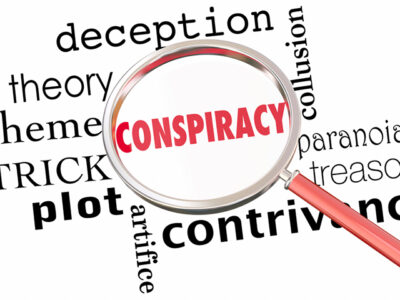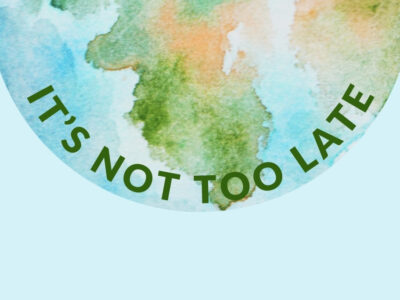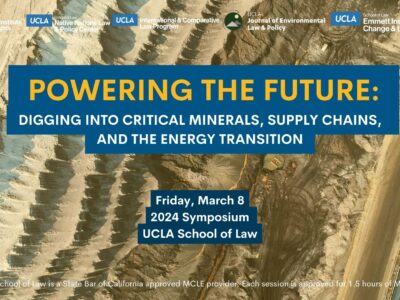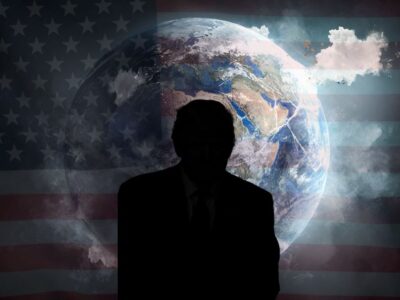Culture & Ethics
Did the COVID Response Poison the Well for Climate Action?
Sadly, the answer may be yes, at least for one conspiracy-minded segment of the population.
One meme that seems to be popping up is that the “evils” of the COVID response reveal some dark reality behind climate policy. Whatever its roots, these dark fantasies threaten the welfare of current and future generations.
CONTINUE READINGClimate Action for Earth Day
“We have a long way to go, but we’ve started down the path.” I asked my UCLA Emmett Institute colleagues what climate actions give them hope on Earth Day. Here’s how they answered.
Don’t believe what you’ve heard. There is one single thing you can give up that will help address climate change: voter apathy. One-third of eligible voters—80 million Americans—did not vote in the presidential election last time around. Why not? Because they just “weren’t registered” or they “weren’t interested in politics,” according to this Ipsos survey. …
Continue reading “Climate Action for Earth Day”
CONTINUE READINGA Total Eclipse of the Heat
The eclipse mania gripping U.S. media and the entire nation is an opportunity to gaze in awe at the climate crisis we’ve unleashed and talk about our collective response.
Millions of Americans traveled this week to the path of totality to hunker down with loved ones and total strangers to gaze upwards at one of the most amazing astronomical events of our lives and share something like a transcendent, spiritual experience. I hope we can collectively reckon with another terrifyingly awesome atmospheric event: the …
Continue reading “A Total Eclipse of the Heat”
CONTINUE READINGNo, EVs are Not Worse for the Planet
There’s an electric car culture war raging. It doesn’t hurt to say obvious things, like that electric cars reduce driving costs and pollute far less than gas-powered cars.
If you have somehow managed to escape the frenzied political headlines about electric vehicles, first I envy you and second, I must regrettably inform you that the EV has become an acronym of partisan rancor on par with IVF, DEI, and CRT. There’s a lot of reasons for this electric car culture war: President Biden …
Continue reading “No, EVs are Not Worse for the Planet”
CONTINUE READINGCritical Insights on the Mineral Boom: Part II
A vision to ensure enforceable community benefits from mineral extraction: Insights from the Emmett Institute’s “Powering the Future” symposium.
“Voice, agency, and meaningful compensation.” Those are the things that California Tribal Affairs Secretary Christina Snider-Ashtari said must be granted in exchange to some communities bearing the brunt of the energy transition and the new mineral boom, as recounted in Part One of this series. All week, my colleagues and I are sharing summaries, outcomes, …
Continue reading “Critical Insights on the Mineral Boom: Part II”
CONTINUE READINGCritical Insights on the Mineral Boom
In the race for critical minerals, the challenges, tradeoffs, and potential winners are becoming clear. Insights from the Emmett Institute’s “Powering the Future” symposium.
A couple hundred miles north of the Las Vegas strip at Rhyolite Ridge you’ll find a dusty yellow wildflower called Tiehm’s buckwheat that grows nowhere else in the world. But this flower sits atop a massive, untapped lithium reserve that would help the U.S. transition to cleaner energy. Now, what if you had to choose …
Continue reading “Critical Insights on the Mineral Boom”
CONTINUE READINGRFK Jr. Joins the War on Climate Scientists
RFK Jr. has filled a top campaign position with an anti-vaccine activist named Del Bigtree who has called global warming “an enslavement system.”
Robert F. Kennedy Jr. made headlines when a Super PAC supporting his presidential bid ran a pricey Super Bowl ad, stealing the look of a famous 1960 spot for his uncle John F. Kennedy. But he got far less attention for another move that says a lot about his campaign: He has tapped Del Bigtree …
Continue reading “RFK Jr. Joins the War on Climate Scientists”
CONTINUE READINGClimate Election 2024: Trump Plans to Drain the EPA
The battle plan for a second Trump term includes reinstating Schedule F to remove climate experts from the U.S. government.
Donald Trump could “F” the federal government. Literally. Far-right policy strategists are laying plans, largely endorsed by the Trump campaign, for getting rid of federal government workers who might otherwise stand in the way of a radical deregulation agenda. It’s called “Schedule F,” and it could be used to strip employment protections from as many …
Continue reading “Climate Election 2024: Trump Plans to Drain the EPA”
CONTINUE READINGDr. King, Community, and Climate
Climate policy turns on an issue highlighted by Dr. King: Whose suffering counts?
“A genuine revolution of values means in the final analysis that our loyalties must become ecumenical rather than sectional. Every nation must now develop an overriding loyalty to mankind as a whole in order to preserve the best in their individual societies.” Those words are from a 1967 speech delivered at Riverside Church by Dr. …
Continue reading “Dr. King, Community, and Climate”
CONTINUE READINGDreamin’ of a White Christmas
It didn’t start out as a song about climate change, but it could be prophetic.
To the modern ear, it sounds like a song about climate change: I’m dreaming of a white Christmas Just like the ones I used to know Where the treetops glisten And children listen To hear sleigh bells in the snow The song actually isn’t about climate change — the lead-in, which is much less familiar, …
Continue reading ” Dreamin’ of a White Christmas “
CONTINUE READING












